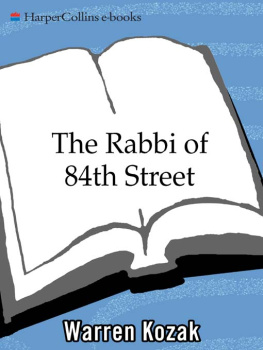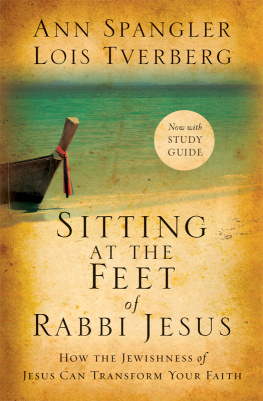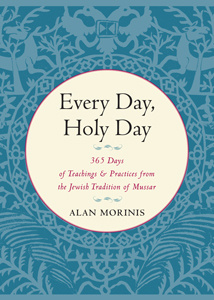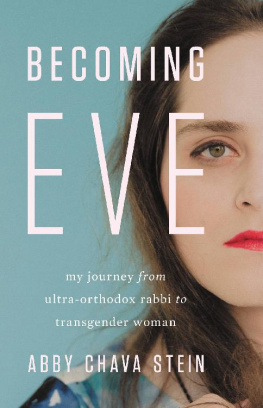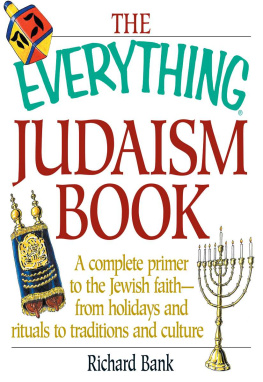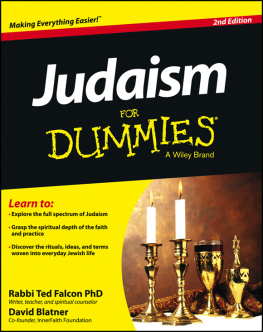To Ronald S. Lauder, who brought Rabbi Besser into my life and the lives of so many others.
And to Lisa and Claire.
T he doormen at the elegant building on Manhattans Upper West Sidelike most doormen everywhereknow the buildings tenants mainly by the schedules they keep. But after fifty years, they still dont quite know what to make of the buildings perhaps most unusual resident, Haskel Besser.
On the one hand, the man is rigorously predictableso much so that the doormen can set their watches by his movements. But there are a number of oddities that still leave them scratching their heads after all this time. First, Haskel Besser never seems to sleep. Most nights, if hes not on a plane to Eastern Europe or the Middle East or Washington on business, he comes home by cab between midnight and 2 A.M . Yet he is still out the door every morning at 6:30 sharp, before most of his neighbors are even awake (hes actually been up and working since 4:30).
The other oddity the doormen can count on day or nightand this is really surprising, considering Haskel Bessers backbreaking scheduleis that this man is always smiling. Not just any smile. Its a smile that follows the laws of nuclear physics in that it sets off a chain reaction. People smile when they see him smiling. With his flowing white beard and a twinkle in his eye, he seems to possess that rare alchemy that simply makes people happy when they see him.
The reason for the nonstop schedule is not that he is a type-A personality. This is hardly a frenetic manhe is actually quite calm. But he seems to have pushed at least three lifetimes into the one he was given because he feels he has an enormous debt to pay. And Haskel Besser is a man who has made it a point throughout his life never to be in debt.
A long time ago in what could only be described as another world, Haskel Besser was given an extraordinary opportunity andwhile he is very grateful for ithe has spent much of his life trying to understand why it came to him.
Hasidic Jews believe that every human being on earth has been given the greatest gift possiblethe gift of life. What that person makes of it, how he spends it, whether its in honest hard work and study or idle sloth, is up to the individual. People can work to improve themselves and make the world a better place than when they arrived or they can do nothing, leaving the work for others. Its their choice.
Haskel Besser was taught this as a child. It made a huge impression on him. And because he believes it with all his heart, he has spent his lifenow more than eighty yearsusing his great charm, swift intelligence, and unusual capacity for hard work in the pursuit of three goals:
He has conducted his entire life with the goal of bringing honor to his G-d and his people.
He has single-handedly tried to undo a terrible wrong that happened before most of the people on earth today were even born, despite the fact that he was not responsible for it.
And he has spent his life studying and learning so that he might someday understand why, while all people on earth are given the gift of life, he received that precious inheritance not once, but twice.
W hat Haskel Besser does bestand he does a lot of things very wellis demolish any preconceptions people may have of religious Jews.
On the one hand, he is indeed a Hasidic rabbi with a black suit, a black fedora, and that long gray beard. His appearance is always immaculate and he never deviates from it, no matter what the season. If hes just going down to the corner to buy a newspaper, he wears a suit with a vest, starched white shirt with cuff links, and a tie.
Partly thats because of the European tradition in which he was raised. But this immaculate attention to image also gives away another detail of his personality. He understands his context in the greater, non-Jewish world, and he knows that when he walks out his door, people will judge not Haskel Besser, but all rabbis and, hence, all Jews, by the way he conducts himself. Thats never far from his mind and accounts, in part, for his courtly manners that are both charming and somewhat out of place in twenty-first-century America. This is a gentleman in the old sense of the word. It is also someone who takes his position very seriously.
Besides the suit and tie, there is one more crucial piece of attire: he always has a yarmulke on his headoutside, inside, anywhere. (And on Shabbos and Jewish holidays, he wears a streimela round, fur hat Hasidic men don on special occasions.)
Many years ago, when Haskel Besser was a young man living in British Palestine, a prospective colleh (bride) asked him why he continued to wear this outfit, which may have made sense in Poland, but seemed to make no sense in the airless humidity and heat of Tel Aviv.
She had a point, the rabbi admits. It was uncomfortable. But I dressed that way then and now because my father and his father did the same.
Traditions, for Rabbi Besser, come in all sorts of large and small packages and he considers all of them important. But there is another crucial facet to this mans personality that sets him apart from many other equally observant Jews who dress the same way and follow the customs of their forefathers. He is also very much a part of the outside, non-Jewish world. His circle of friends includes Jews and non-Jews. He has a deeply sophisticated knowledge of literature, music, and politics. And while his understanding of Talmud and Torah is legendary and he is respected by the most famous rebbes in the world, his admirers extend far beyond that world. He has been an invited guest at White House dinners and presidential inaugurations. He is the recipient of one of Polands highest civilian medals and he is admired throughout Germany and Austria. He even counts the president of Romania as a good friend. But power brokers are hardly the epicenter of the rabbis life.
With a unique sense of humor and a special knack for telling a story, he is also a master of the disarming gesture. The rabbi has been known to be distracted by moths.
One Friday night, a moth was flitting about the window of the Besser dining room during the Shabbos dinner. The candles were glowing, the rich, warm smells of dinner wafted through the room, and the rabbi got up to open the window to let the confused insect outside.
It looks like the butterfly would rather be out than in, he said.
A guest corrected him: It isnt a butterfly, its a moth.
I know, the rabbi responded with that smile, but its Shabbos and I wanted the moth to feel a little better about itself. Everyone should feel better on Shabbos.
All creatureshigh and lowget equal treatment.
T HE S HTIBEL
Rabbi Besser has a definite destination when he leaves his house at 6:30 every morning. Its the same trip he has made daily for the past fifty years: he crosses the street.
The destination is a brownstone house that, except for the discreet Hebrew lettering over the front door, looks like all the other brownstones on this residential block of Manhattans Upper West Side. But walking through the front door of that brownstone is like walking through a portal into another era. You could easily be in Eastern Europe a century ago.
At 6:30 in the morning, the rabbi is often the first person to arrive. He goes through the usual ritual of unlocking the door, turning on the lights, and walking up the stairs, perhaps a bit slower than he once did. Sometimes Doc, his friend and the unofficial caretaker of the building (Docs day job is cardiology), gets there first and takes care of these mundane details. But the rabbi is happy to do them himself.

